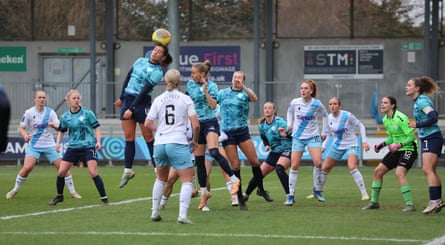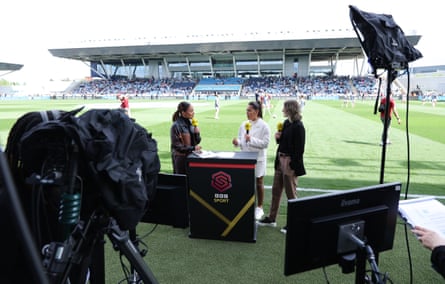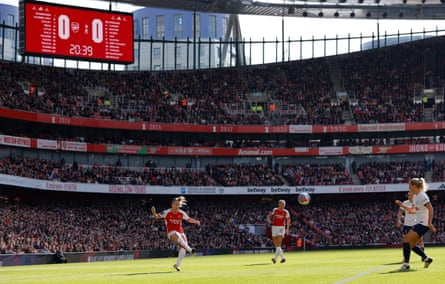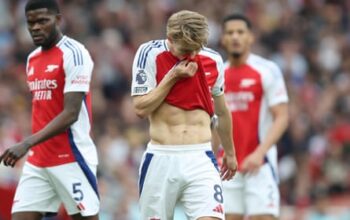The most powerful person in English women’s football takes a breath, scans the room and seems to pause for reflection. Nikki Doucet, the chief executive of the new company that is now running the top two women’s leagues in the country, has just been asked how it is going and the look in her eyes suggests there’s a lot she wants to say. “It’s a rollercoaster and it’s hard, but it’s fantastic. It’s so hard but it’s so great.”
The former Nike director is at the national football centre in St George’s Park, to sit down for her first newspaper interview since taking on the job of leading the team that runs the Women’s Super League and Women’s Championship. That responsibility was legally transferred over from the Football Association on 15 August but she has been in the post since November during the transition. It is a job she wanted to take on “because it’s an opportunity to help push women’s rights forward, through the power of sport” and she believes wholeheartedly in the game’s future.
The new entity, previously dubbed “NewCo” and now renamed temporarily as “Women’s Professional Leagues Ltd (WPLL)” until a longer-term name is chosen, is going to be under immense pressure to deliver. “The job is to create and build the most distinctive, competitive and entertaining women’s football club competition in the world,” she says. “That’s the thing we need to obsess over.”
The “we” is Doucet’s new, four-strong, all-female executive leadership team. “It’s because they’re the best people,” she says. “I don’t want to create a gender narrative, that’s not what I’m trying to do. I was lucky to have great leaders from both genders. I’ve also had bad leaders from both genders.
“I believe in thought-diversity and a workforce that represents the population – I think our game needs to do more for diversity – but I care most about getting the best people so I can empower them to be great. Ruth Bader Ginsburg [the former US supreme court judge] said: ‘Why shouldn’t the supreme court be all women?’
“The qualities of being a female are also qualities of strong leadership, whether that’s emotional intelligence, empathy, compassion – my definition of leadership has changed since I’ve become a mother. I want to put in place structures that reduce stress from the team, to allow them to thrive.
“I was listening to a podcast this morning that said, for Google, one of the stresses there was they had a lot of employees commuting from San Francisco to Silicon Valley, so they invested in buses with wifi – that’s the type of thought leadership I’m inspired by. I [ask myself]: ‘How do I create a work environment that’s super high-performing, has employee retention, thought diversity, and that supports people?’ I care about that.”

It has already been a summer of highs and lows, perhaps best summed up by a 24-hour period in late June when – a day after the London City Lionesses owner, Michele Kang, staged a Mayfair press conference and pledged to invest in a world-class facility to try ultimately to win the WSL – Reading requested to withdraw from the Championship because of financial concerns and soon the Berkshire club soon dropped down three divisions.
“It’s an incredibly devastating situation,” Doucet says of Reading. “This is a startup. At the beginning of any evolution, you’re going to have some investors who believe in this future, like Michele Kang and some others, but then you’re going to have other investors that say: ‘My risk profile is different in terms of what I’m willing to invest today. I can’t make the numbers work so I’m not going to invest.’
“That’s just the reality of where we are. Providing the right infrastructure for players and staff is expensive and it is an investment ahead of revenue – an investment in the next generation of sport – and we have to find the owners that believe in that.”
With Reading’s withdrawal leaving an uneven number of teams in the Championship for the new season, some are wondering if another club could have replaced them or if a reprieve could have been granted to one of the relegated clubs. Doucet says: “It was down to timings and governance. It was a super complicated situation and the time was really tight. We had to make sure we had competition integrity for next season and it was not an easy decision. It went through rigorous governance review and discussions with all the right parties.”
The 23 remaining clubs in the WSL and Championship are shareholders in the WPLL, along with the Football Association, and the company has received a £20m interest-free loan from the men’s Premier League, but what everybody involved knows is needed, for the long term, are lucrative revenue streams and a broadcast deal that can help the leagues to stand on their own feet.

For 2024-25 the domestic television deal, shared between the BBC and Sky Sports, has been rolled over for one more year. Commercial deals are also high on the agenda. So when it comes to attracting investment, how is it going?
“It’s harder than I thought,” Doucet says. “Because women’s football has to do more to prove the return on investment, so even though we have stats that are comparable to other sports, other challenger sports and other challenger brands, you’re constantly having to prove that there’s a market.
“It’s different to men’s football. It’s easy to sell men’s football today. So we have to invest and learn how to talk to a fanbase that we don’t talk to normally and we have to create different content.”
after newsletter promotion
Understanding the supporters is something Doucet’s teams have spent a huge amount of time analysing and she believes they have not yet realised the full potential of the fanbase. Some of their data and research suggests there are three types of attendees and one – which she likens, in terms of demographic, to Swifties – she feels are not yet being fully served.
Doucet calls the core fans who come week in, week out “arguably the most important – they’re the visionary consumers ahead of all the trends”. Then there is a section of fans who are regular men’s football match-goers taking their children to a women’s game because it is family friendly. She believes a vast, third group has transformational potential.
“In the middle, you have a fan that’s come in through the Lionesses, untethered to the men’s game. They’re not tribal and they’re learning about us. They’re trying to find highlights, they love the players and that’s the biggest group that the football ecosystem doesn’t know enough about.
“That’s your ‘Taylor Swift fanbase’ for that particular analogy. And I don’t think anyone talks to them in the way that we need to. We have a responsibility to.”
The WSL displays enormous variations in fan engagement. This season, Arsenal will play at least 11 home games at the Emirates Stadium and they have repeatedly filled the 60,000 seats, but last season other clubs had attendances of less than 1,500.

That is symbolic perhaps of a sport undergoing rapid change. And there will be many more changes because it is clear Doucet’s team are undertaking a wide‑ranging review of every aspect of the WSL and Championship and not ruling anything out.
Asked if the leagues could expand the number of teams, whether a playoff system could be introduced and if she is open to B teams akin to those seen in Spain, Doucet gives virtually nothing away. “Being independent will allow us to review what the right structure is that the fans want. The things we care about will be: Are we creating a really competitive league? Does it have jeopardy? And are we telling the storylines of the players and rivalries within the season? We need to review what gives us that, long term.”
Whatever they decide to do, the whole sport will be watching very closely.
Source: theguardian.com


